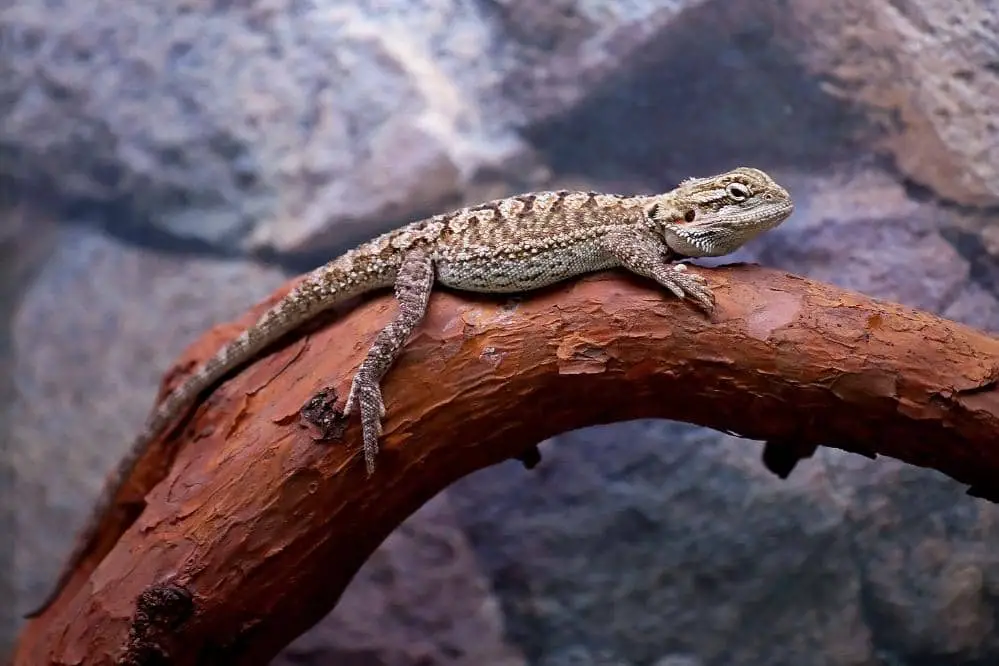Brumation is an essential part of every bearded dragon’s life, and both wild and pet bearded dragons undergo this phase. Many beardie owners (particularly novice owners) generally get confused when they observe that their new friend is sleeping all the time without eating or drinking and wonder, “Is something wrong with my bearded dragon” or “should I wake my bearded dragon.”
In case you don’t know, brumation is actually a phase of their lives when bearded dragons may sleep continuously for many days to weeks. Technically speaking, you should not disturb their sleep, although many other factors are involved and should be kept in mind. Before diving into the details of “why you should not wake your bearded dragon,” first it’s essential for you to understand “what is brumation,” “why bearded dragons brumate,” “at what age bearded dragons generally brumate,” “how long can a bearded dragon brumate” etc.
If you are a novice beardie owner facing the same situation and have all the questions mentioned above in mind, continue reading.
What Is Bearded Dragon Brumation? And Why Do Bearded Dragons Brumate?
Although the word “brumation” is new for most first-time beardie owners, all of us are familiar with the word “hibernation.” You can take brumation as a reptilian version of hibernation. Technically, the word hibernation is used for some amphibians and warm-blooded animals (like mammals), and the word brumation is used for cold-blooded animals (like reptiles, etc.).
As the winter season approaches, the feed resources begin to dwindle as most of the vegetation and insects die out, and bearded dragons find it difficult to get sufficient food to survive. On the other hand, the environmental temperature decrease, and enough sunlight and heat are not available to carry on digestion and other vital functions of the body. (We know that bearded dragons are cold-blooded and depend on external heat sources for their survival).
So brumation is their way to avoid the winter season, when they slow down their metabolic functions, limit their activity, and spend most of their time sleeping for long to conserve energy. Sometimes bearded dragons also cover themselves with sand or burrow holes (to sleep in them) to protect themselves from predators and benefit from underground moisture to avoid dehydration. This process of prolonged sleeping without eating, drinking, or other activity is called brumation in reptiles.
Although hibernation and brumation are the same things and happen due to the same reason, there is a big difference between these two. Generally, when mammals hibernate, they have enough fat reserves to survive for months, and they wake only when the hibernation is over. While bearded dragons and other reptiles don’t eat and defecate, they have to wake up after a while (for a short duration) to drink water.
How Long Do Bearded Dragons Brumate?
Since brumation is linked with the arrival of the winter season and a drop in external temperature, it will continue until the winter ends and the temperature begins to rise. So you can expect your bearded friend to brumate for 1- 3 months depending on the length of the winter season in your part of the globe.
Do Bearded Dragons Brumate In Captivity?
Yes, there is the possibility that your pet can brumate guided by their instinct, inherited from their wild ancestors. However, not all bearded dragons in captivity will brumate because, firstly, in captivity, there is a continuous food supply and beardies never face food shortage. Secondly, the temperature and light hours are being maintained artificially so there is never a decrease in day length and the temperature never falls below a certain level.
Some bearded dragon owners like to reduce the light hours to match the natural day length as the winter arrives, so this reduction in the light hours or if the temperature inside the tank drops due to any reason both these factors can trigger the brumation. So if your bearded friend is avoiding food, lying still, he may be getting ready to brumate or already brumating. On the other, most pet bearded dragons don’t brumate at all.
How Often Do Bearded Dragons Brumate?
Generally, in the wild, bearded dragons brumate once every year during the winter season. However, in captivity, it’s difficult to correctly predict “how often bearded dragons will brumate” because it depends on the individual personality of a bearded dragon, and every beardie has its own pattern of brumation. In captivity, you can expect your bearded dragon to brumate once a year, twice a year, once in a lifetime, or may not brumate at all. Whatever the case may be there is nothing to worry about.
Should I Wake My Bearded Dragon From Brumation?
“NO” since brumation is a natural process (like eating, mating, basking, etc.), you should not force your bearded dragon to wake. Once your bearded friend has started brumation, the better way is to facilitate the bearded dragon by turning the lights off, lowering the temperature, and allowing him to complete his sleep and wake naturally. Because if you try to wake them and interrupt their sleep, it prolongs the duration of brumation. However, remember that generally, bearded dragon experiences their first brumation after their first birthday, so if your baby bearded dragon is showing the signs of brumation, it’s a matter of concern because baby beardies don’t have enough fat reserves to meet the energy requirements during brumation. So you should consult a vet about your baby bearded dragon.
How To Stop/Avoid Brumation
As mentioned above, brumation is a natural process connected with the season. Since the season is not in our control, so is brumation. Once your bearded friend decides to brumate, you can do nothing about it but facilitate the process. However, if you don’t want your bearded dragon to brumate or your beardies are less than one year old, you should ensure that they don’t sense that the winter season is approaching. You should increase the tank’s inside temperature to 105 °F and increase their light hours to 14 hours daily. Even so, there is no assurance that this trick will work; still, some beardies will enter deep sleep regardless of what you do to keep them awake.
So if this happens and you own an adult bearded dragon, you should let it happen naturally. On the other hand, if you own a baby beardie, you should consult a vet.
What Happens After Your Bearded Dragon Wakes?
If your bearded dragon was healthy, weighed normally according to age, and the brumation completes naturally without any interruption, your bearded friend will be as healthy at the end of brumation as before. They will behave as if nothing has happened, so you should do the same and return to the feeding, lighting, and heating schedule that was being followed before the brumation begins.
Conclusion
Brumation is a natural process, and in the wild bearded dragons undergo brumation as the winter approaches to conserve their energy. However, bearded dragons in captivity may or may not brumate depending on their personalities and weather conditions. If your bearded dragon is brumating, you should not interrupt their sleep and let them wake naturally because interrupting their sleep can prolong the duration of brumation.

